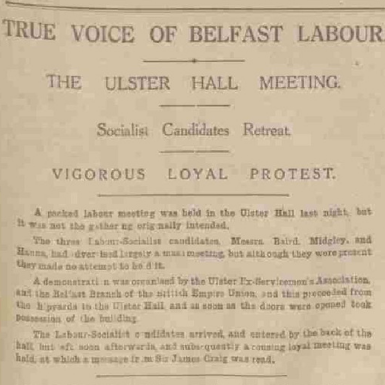Labour Meeting Disrupted at Ulster Hall
18 May 1921

Northern Whig, 18 May 1921
The Belfast Labour Party unsuccessfully put forward four candidates at the 1918 general election, but had greater success a year later when it won ten seats on Belfast City Council. The emergence of class politics, however, was interrupted by the sectarian strife that spread across Ulster from 1920. Though Labour was unable to field candidates at the 1921 Northern Ireland general election, four independent candidates stood representing the party’s interests. Loyalists criticised their anti-partitionist stance and identified them as Sinn Féin or Nationalist sympathisers. All the candidates performed poorly at the 1921 election. The following report from the Northern Whig details how a Labour meeting was interrupted by the Ulster Ex-Servicemen’s Association and the Belfast Branch of the British Empire Union.
The Scene Outside. A Large Demonstration.
The announcement that the three eleventh-hour Socialist-Labour candidates – Councillor Baird, Mr. Henry Midgley, and Mr. J. A. Hanna – intended to address a meeting last night in the Ulster Hall gave rise to much speculation as to what the result would be. Lively scenes were anticipated, but those who turned up at the hall in expectation of a stormy meeting got something very different, and the proceedings according to programme never took place.
On the contrary, a determined loyalist crowd entered the hall as soon as the doors were opened, and three socialist candidates made no appearance on the platform. They had arrived some little time previously, and were in conversation with some of those responsible for the opposition proceedings. An invitation was given to them to proceed with their meeting, but evidently the prospect was not relished, and they retreated, leaving the building in possession of a large and enthusiastic crowds mainly composed of shipyard workers.
The counter-demonstration, which was a large one, was organised by Mr. Robert Boys, secretary of the Ulster Ex-Service Men’s Association, and Mr. Leo Thomas, secretary of the Belfast Branch of the British Empire Union, and started from the shipyards. The men for the once allowed their teas to go by the board, and marched to the hall headed by a brake and band. On arrival in Bedford Street the period of waiting till the doors were opened was passed in chorussing [sic] loyal airs, listening to selections by the band, while short speeches were delivered by Messrs. R. Tregenna and Alex. McKay.
In the course of these it was pointed out that the demonstration was a protest to show that Messrs. Baird, Midgley, and Hanna did not represent labour. It was emphasised that the election expenses were not provided by Belfast labour, and attention was drawn to the part they had taken in connection with the Catholic Expelled Workers’ Fund …














